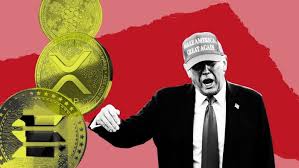Buckle up, crypto enthusiasts—2025 is shaping up to be a blockbuster year for digital assets in the United States, and Donald Trump’s administration is steering the ship. With a flurry of executive orders, a pro-crypto cabinet, and a Congress itching to pass landmark legislation, the U.S. is racing to become the “crypto capital of the planet,” as Trump promised on the campaign trail. Here’s the lowdown on how his policies are rewriting the rulebook for cryptocurrency this year.
A Pro-Crypto Power Play
Trump kicked off his second term with a bang, signing an executive order on January 23, 2025, titled “Strengthening American Leadership in Digital Financial Technology.” It’s a love letter to the crypto industry, pledging to “support the responsible growth and use of digital assets, blockchain technology, and related technologies across all sectors of the economy.” Gone are the Biden-era crackdowns—think SEC lawsuits against Coinbase and Binance—and in their place is a vision of regulatory clarity and innovation.
The order’s big moves? It bans central bank digital currencies (CBDCs) in the U.S., sets up a President’s Working Group on Digital Asset Markets led by “Crypto Czar” David Sacks, and tasks it with crafting a federal framework within 180 days. Oh, and it’s exploring a national digital asset stockpile—potentially using the 200,000+ Bitcoins (worth about $17 billion) the feds have seized from criminals. Trump’s not just talking the talk; he’s walking it with a Strategic Bitcoin Reserve announced on March 6, a first-of-its-kind move that’s got Bitcoin bulls buzzing.
The SEC Gets a Makeover
The Securities and Exchange Commission (SEC) is shedding its old skin under Trump’s watch. Gone is Gary Gensler, the enforcement-happy chair who sued crypto firms left and right. In his place? Paul Atkins, a former SEC commissioner and crypto advocate, confirmed as chair in late January. Atkins is joined by Hester Peirce—aka “Crypto Mom”—who’s leading a rebooted Crypto Task Force launched January 21. Their mission: ditch the “regulation by enforcement” vibe and build clear, innovation-friendly rules.
Already, the SEC’s hitting pause on high-profile cases—like the one against Binance—and rescinded a 2022 accounting rule that made it pricey for firms to custody crypto. At a March 24 roundtable, Peirce said it’s a “new beginning” for crypto regulation, debating whether tokens need their own framework or fit under existing securities laws. The industry’s cheering, but some worry a lighter touch could let fraudsters slip through the cracks.
Congress Jumps In
Lawmakers aren’t sitting this one out. With crypto companies pouring nearly $250 million into the 2024 election (outpacing Wall Street!), pro-crypto candidates flipped key seats, and now Congress is primed to act. Two big bills are in the spotlight: the Financial Innovation and Technology for the 21st Century Act (FIT21), which could classify decentralized assets as commodities under the Commodity Futures Trading Commission (CFTC), and stablecoin legislation like the Clarity for Payment Stablecoins Act. Insiders like Coinbase CEO Brian Armstrong predict a stablecoin law could hit Trump’s desk by May, fueled by bipartisan momentum and the Senate’s GENIUS Act approval in March.
Trump’s picks—like Brian Quintenz for CFTC chair and Scott Bessent for Treasury Secretary—are crypto fans too, pushing for rules that boost growth over restriction. At the White House Crypto Summit on March 7, industry titans like Armstrong and Robinhood’s Vlad Tenev pitched their wish list: stablecoin clarity, a Bitcoin reserve, and broader market reforms. The vibe? The industry’s in the driver’s seat.
What’s It Mean for Crypto?
This is a 180 from Biden’s tenure. Trump’s order protects crypto firms’ access to banking—countering alleged “debanking” woes—and his team’s eyeing tax breaks and capital gains clarity for hodlers. Bitcoin’s already soared past $100,000, and altcoins could ride the wave if FIT21 reclassifies them as commodities. A national stockpile might juice demand, though critics warn it’s a gamble if prices tank.
For everyday folks, tokenization could open private markets to retail investors, as Robinhood’s Tenev argued at the summit. But not everyone’s sold—the Center for Political Accountability warns deregulation and crypto’s political clout could erode trust if scams spike. And with 80% of stablecoin action happening overseas, global alignment’s a wild card.







